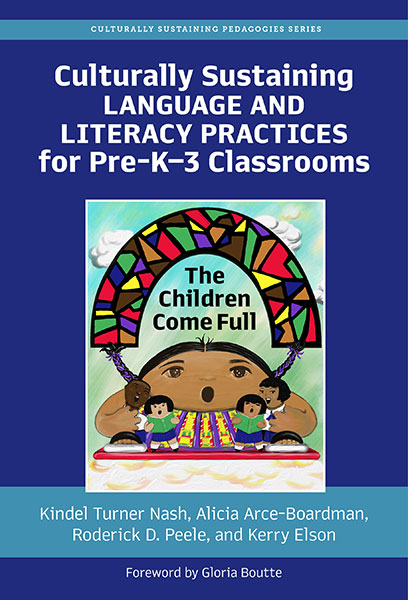By: Kindel Turner Nash, Roderick Peele, Alicia Arce-Boardman, and Kerry Elson
Kindel Turner Nash is an associate professor of early childhood education at the University of Maryland, Baltimore County. Alicia Arce-Boardman is a bilingual early childhood educator at Northern Parkway School in Uniondale, New York. Roderick D. Peele is an early childhood educator at Northern Parkway School in Uniondale, New York. Kerry Elson is an early childhood educator at Central Park East II in East Harlem, New York. They are the authors of Culturally Sustaining Language and Literacy Practices for Pre-K–3 Classrooms: The Children Come Full.
In recent years, as attention to racial justice in schools has heightened, many teachers and school leaders have been drawn to culturally sustaining pedagogies (CSPs). Django Paris and Samy Alim have defined CSPs as “a critical framework for centering and sustaining Indigenous, Black, Latinx, Asian and Pacific Islander communities as these memberships necessarily intersect with gender and sexuality, disability, class, language, land, and more” (Alim et al., 2020). Ladson-Billings (2014) and Paris (2012) have described CSPs as an outgrowth of culturally relevant teaching (Ladson-Billings, 2021) and other asset-based pedagogies.
As three early literacy classroom teachers and a university-based teacher educator, we have been working to understand and document CSPs in early childhood contexts for many years. For us, CSPs offer a vision of racial justice and liberation divested from the specter of racial violence and colonial logic that often haunts schools. As the body of research and practice around CSPs has continued to evolve and grow, collectively, CSP scholar-activists have identified features of CSPs in classrooms and other settings. Applied to the language and literacy teaching of young children, we have identified the following collective features:
- Critically centering children’s literacies, languages, and knowledge
- Valuing children’s and communities’ agency and input so that we are accountable to the communities we serve
- Historicizing content and instruction to connect learning to the histories of racial, ethnic, and linguistic communities, neighborhoods and cities, and the larger states and nation-states
- Building children’s and our own capacity to contend with internalized oppressions and to counter messages and systems that suggest that marginalized students and families are the problem and that value White, middle-class, monolingual, monocultural values
- Working with children and communities to sustain right, reciprocal relationships with the land
- Curricularizing these features in learning settings
You will also find rich descriptions of culturally sustaining early literacy practices in our forthcoming book, Culturally Sustaining Language and Literacy Practices for Pre-K–3 Classrooms: The Children Come Full. This book is published in Teachers College Press’s Culturally Sustaining Pedagogies series, edited by Django Paris.

References
Ladson-Billings, G. (2014). Culturally relevant pedagogy 2.0: Aka the remix. Harvard Educational Review, 84(1), 74–84. https://doi.org/10.17763/haer.84.1.p2rj131485484751
Ladson-Billings, G. (2021). Culturally relevant pedagogy: Asking a different question. Teachers College Press.https://www.tcpress.com/culturally-relevant-pedagogy-9780807765913
Paris, D. (2012). Culturally sustaining pedagogy: A needed change in stance, terminology, and practice. Educational Researcher, 41(3), 93–97. https://doi.org/10.3102/0013189X12441244
Paris, D. (2021). Culturally sustaining pedagogies and our futures. The Educational Forum 85 (4), 364–376. https://doi.org/10.1080/00131725.2021.1957634
Photo by Katerina Holmes at Pexels
